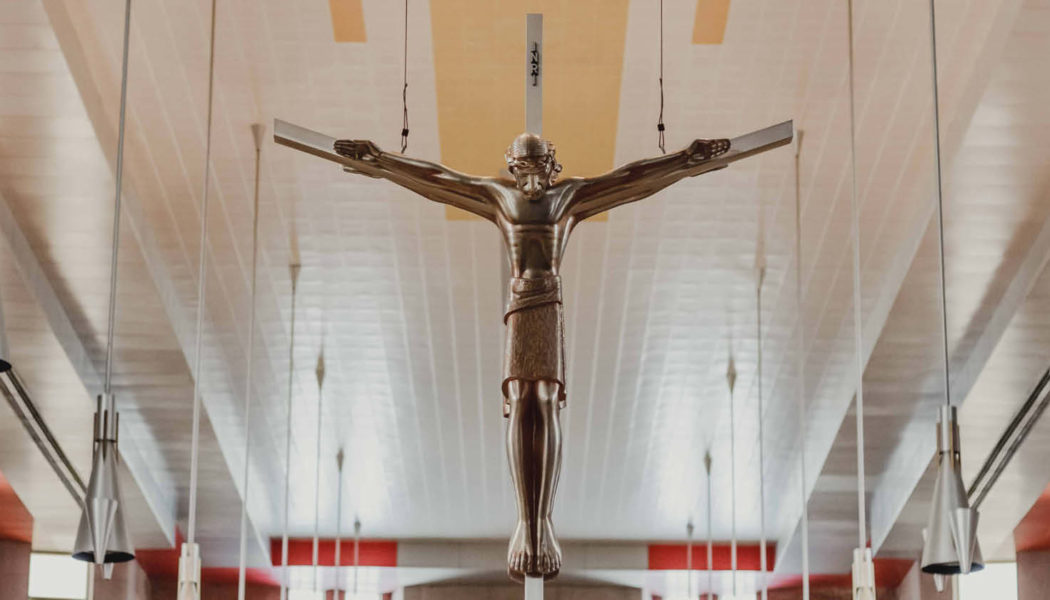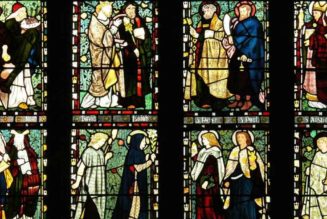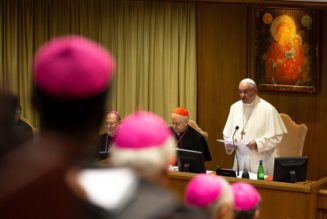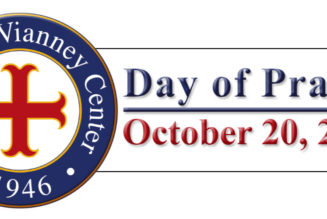
This Sunday’s Gospel, the Solemnity of Our Lord Jesus Christ, King of the Universe, Year B, gives us two crucial examples to learn from.
First, Christ is an example of how to be courageous when we are faced by the Pontius Pilates of the world. But a second example is just as important — we need to face Jesus when we meet him without ourselves becoming a cocky, self-assured Pilate.
Pilate and Jesus are both confident in their confrontation, because they both have faith in the power that backs them.
Pilate faces the son of God — the Way , the Truth, and the Life — and seems to know Jesus is innocent. But he is willing to condemn him anyway because he thinks he has nothing to fear: Caesar has his back, along with the whole force of Rome.
So Pilate asks him boldly: “Are you the king of the Jews?”
Jesus certainly is that. He is a descendant in the line of David, the Messiah, and that makes him a king — but he knows what Pilate is really asking. Pilate wants to know: “Are you a rival claimant to the authority of Caesar?”
Jesus is not that. He has told his followers to render their coins, in the image of Caesar, to Caesar; Jesus only wants what is in his likeness — their souls. But while he doesn’t threaten Rome’s claim on earthly power, he does threaten Rome’s claim on hearts, and he does so with even more confidence than Pilate, because God himself has Jesus’s back, with the whole host of angels.
He puts Pilate on the spot, demanding to hear his evidence: “Do you say this on your own, or have others told you about me?”
Pilate is exasperated. “I am not a Jew, am I?” he says, then settles on a new, more timid question that attempts to cut to the chase: “What have you done?”
Jesus answers this one fully: He reveals to Pilate what his kingship truly is. “My kingdom does not belong to this world,” he has said. He adds: “For this I was born and for this I came into the world, to testify to the truth. Everyone who belongs to the truth listens to my voice.”
Jesus is masterful. But we should admit it: When we meet Jesus in our own lives, we often treat him like Pilate does.
The Gospel for Christ the King Sunday comes at the bitter end of Jesus Christ’s 33 years on earth. His precursor has been beheaded, one apostle has betrayed him, another has denied him, and nearly all the rest have abandoned him. His religion’s chief leaders have condemned and imprisoned him. Pilate considers him done and defeated, and the evidence would suggest he is right.
We often make the same judgment when we face Jesus in his Church, in his Scripture, in the poor, and in our conscience.
The Church is the body of Christ and each of her ministers is an alter Christus, another Christ, but that’s not how we treat them. We dismiss the laity, dislike the priests, are disgusted by the bishops and disappointed by the pope — and we have no qualms about saying so to whoever will listen, or whoever happens to see our social media posts.
Or maybe we meet Jesus in the Bible and find him wanting. The Church “has always venerated the Scriptures as she venerates the Lord’s Body,” says the Catechism. Be we don’t always. We stare down the Scripture like Pilate, dismissing cringey Old Testament passages by saying “I am not a Jew, am I?” and crazy New Testament passages by scoffing, “This is truth?”
Or maybe we are Pilate to the poor. They are the ones who Jesus Christ says he will identify with when he comes as king, such that whatsoever we do to them, “You did it to me.” But they are addicts, losers who could have prevented their failures, people who faced the same problems we faced, only we worked hard and they slacked off. Now they want for free what we earned by sweat. “Your own sins handed you over,” we say. Why should I help you? “What have you done?”
Or maybe Jesus Christ comes before us in our conscience, the voice of God himself in our heart sent to testify to the truth. “Do more,” says our conscience. “Stop settling,” and “Free Jesus in your life to do what he has come to do.” But instead of simply obeying, we interrogate our conscience. “What can you give me?” we ask. “I can get more from money than I can get from you. I find more joy online and more peace in pleasures than I do in prayer.”
We are Pilate to Jesus in this way 100 times a day. Like Pilate, we look him in the eye and say, “Are you really a king? Because you look like a failure to me.”
What Jesus says back to Pilate and to us is what we need to say back to the Pilates who challenge our faith.
“Do you say this of yourself, or has someone told you about me?” he says to Pilate.
“Is this really you talking, or have you been corrupted?” he says to us. “Is this the real you, the you I formed and guided and loved? Is this the same person who looked at the Church with such high hopes before? Is this the one who last Easter was so thrilled by Scripture, the one who last Christmas decided to serve me in my poor? Is this the one who promised me at that retreat that you would always be on my side? Is this the same person who made that ambitious prayer schedule and stuck to it? Is this the real you? Or are you just parroting the critical voices in your friend group and newsfeed? Who has captured your imagination and taken it away from me?”
“You say I am a king,” he tells Pilate, and us.
“You call me ‘Lord God, heavenly King,’ at the beginning of Mass, profess ‘his kingdom will have no end,’ in the creed, and pray ‘Thy kingdom come!’ in the Lord’s Prayer,’” he says. “But do you really believe I am a king? Because I am a king to you — and more. I am the giver who has given you every gift, and the lover who stayed by your side when no one else would. I am the ground of your being and the goal of your life, and hope for the world.”
The Second Reading from Revelation declares who Christ is. He is the “Alpha and the Omega … the one who is and who was and who is to come, the almighty.”
Daniel describes him in the First Reading “Like a Son of man coming on the clouds of heaven” the one who “received dominion, glory, and kingship of all peoples, nations, and languages … an everlasting dominion that shall not be taken away, his kingship will not be destroyed.”
When he comes, he will be “robed in majesty,” says the Psalm. “Every eye will see him, even those who pierced him,” adds Revelation, and “all the peoples of the earth will lament.”
We can be confident in Christ’s love for us and in his power over the world.
Pilate was confident when he faced the Nazarene prophet, because he knew that even though Caesar and the myriad soldiers of Rome were not in the room, they were there on his side.
Jesus was confident when he faced the petty provincial governor, because he knew that even though he couldn’t see the Trinity and the host of heaven, they were there on his side.
We can face the world with the same confidence, knowing that our baptism makes us “‘a new creature,’ an adopted son of God, who has become a ‘partaker of the divine nature,’ member of Christ and co-heir with him, and a temple of the Holy Spirit.”
When the world tries to push us around, we can stand firm knowing that in Christ, we have each been anointed a king.
Push back against Pilate. Never take his side.
Join Our Telegram Group : Salvation & Prosperity








